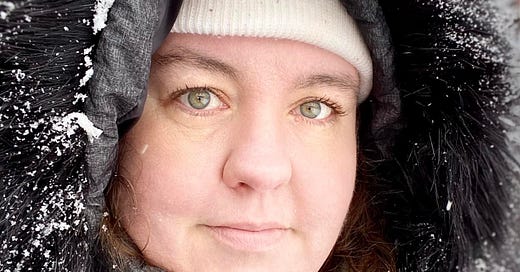Note from Maggie: Wendy Robinson is guest-posting here at Estranged this week. Wendy is a writer, higher education nerd, mom, wife, and friend based in Minnesota. On Substack, she writes about college admissions and financial aid at College Sanity and everything else at Open Water.
Amy’s dad has started forgetting things. She wasn’t too worried until last week when it seemed, just for a minute, like he couldn’t quite remember her name.
Sasha’s parents have a house that is too large, with too many stairs. From three states away, she tries to help them pick a real estate agent and reminds her mother to take her arthritis medicine.
Sitting on the bleachers at her daughter’s swim meet, Camille books plane tickets so she can go take care of her mother, who has had a bad fall. When she arrives at her childhood home, she’ll have to talk her fiercely independent mother into moving into a retirement home or into the spare room in Camille’s house.
I’m in my forties now and I am surrounded by friends who are good mothers. On the all-too-rare occasions when we can get together for long, chatty dinners, we swap stories and commiserate about the ways that very smart kids can make stupid teenage decisions, and wonder how it is possible that these same tiny infant babies are old enough to be starting college visits.
These women are my village. I’ve never felt lonely in my experience of motherhood because I’ve always had these fellow travelers to turn to for guidance, carpools, babysitting swaps, and the occasional “what the actual fuck?” text messages.
But sometimes the conversation turns to the other kind of caregiving they are doing for their aging parents. And I suddenly feel all alone.
My friends are in the “sandwich generation”: they have children at home who still need parenting and parents who are in the final years of their lives. They are making orthodontist appointments and navigating the rules of Medicare. They’re trying to save for upcoming college tuition payments and gasping at the cost of assisted living facilities.
They are good mothers and excellent daughters and I can’t relate.
I was an excellent daughter once. I was a Good Girl. I did my chores, I was a teacher’s pet on a relentless quest for straight As. I didn’t miss curfew or talk back. I went to church three times a week and prayed to be someone else. I decided that all I had to be was perfect and then everything else would be OK.
In a house dominated by my mother’s erratic and sometimes violent moods, I learned to never be angry or needy or sad. I was the peacemaker. Money was always a problem, so I tried not to want. I got my first job at 12 and dreamed of a day when I would always have enough money for a school lunch, or a second pair of shoes.
When the money from my savings account disappeared just months before I left for college, I learned to never trust anyone else to take care of me financially.
I don’t think I took a deep breath my entire childhood. After I left for college, 2,000 miles from home, I vowed that I would never live in my parent’s house again. I learned how to be an adult in a series of cheap, shitty apartments in questionable neighborhoods that all felt safer than my childhood home.
After some spectacularly self-destructive years, I eventually found the world’s most patient therapist, who managed not to roll his eyes when I repeatedly explained that no, I couldn’t be a perfectionist with an eating disorder. It couldn’t be true because I wasn’t skinny enough or good enough at everything to be a perfectionist. I spent hundreds of teary hours and thousands of dollars in co-pays learning to forgive myself for the crime of being a daughter who wanted her parents to love her. It took time to pry open my hands, to let go of my self-hatred at never being quite perfect enough to fix an entire broken family, to give up the dream of a happy childhood.
I couldn’t be a perfectionist with an eating disorder. It couldn’t be true because I wasn’t skinny enough or good enough at everything to be a perfectionist.
Then it took more years, multiple moves that put both geographic and emotional distance between us, and becoming a mother myself before I fully made peace with the fact that there was nothing good or healthy for me in maintaining a relationship with my parents.
After my last child was born, my husband and I finally got around to making a will. At that point, I was ready to state the boundaries I was setting.
I will not provide financial support.
I will not be a caregiver, emotionally or physically.
There will never be a room in our house for them.
I won’t block their numbers, but I won’t be the one to call or text.
If they want to give me updates about their health or finances, they can but none of it will become my problem to solve.
I know these are the right boundaries for me, but I can feel the vestigial flicker of Good Girl guilt when my friends start talking about the challenges of taking care of their aging parents. Some of them were well loved and have always been close to their families, while others had complicated dynamics and prickly relationships. They are all still doing the physical and emotional labor, spreading themselves thin in the name of taking care of the people they love.
I don’t want to do this work. I can’t let myself do this work.
I can’t be the mother, partner, friend, or person I want to be if I slip back into my Good Girl skin.
When my friends share their caregiver stories, I don’t say too much about why I’m not doing the same because when I do, I find myself revealing too much. I blurt out stories, revisiting trauma and abuse in the hope of making sure they don’t think I’m a monster for not visiting my 80-year-old mother in the hospital, or for not flying home when she sent me her first text in three years, telling me she had cancer. I want to pre-empt their judgment. My need for approval is still there—the latent fear that if my friends really knew me, they might not be able to love me.
I spent my childhood being a caregiver to my family out of obligation and fear. I’ve spent my adult years taking care of my children, partner, and friends out of love. Showing up with practical and emotional support is important to me; I am reliable and helpful in crisis. My parents won’t get to see that side of me again, but that doesn’t make me a bad daughter.
My need for approval is still there—the latent fear that if my friends really knew me, they might not be able to love me.
When I watch how well my friends are able to love and care for their aging parents, I can feel alone. But I know that being alone is so much healthier than being a Good Girl. The emotional energy, the money, the time I save by not being willing to care for my aging parents means that I’ll have more of it to give to my children and my chosen family.
It’s Maggie again. I hope you enjoyed this insightful and generous essay from Wendy Robinson. Estrangement from elderly and/or sick parents is a taboo topic, but one in which many people could use support. If you have personal experience to share, please comment, and know that I will delete any replies that are attacking, passive aggressive, or disrespectful. XOXO






To Wendy: good no, great no, FANTASTIC work stopping that dysfunctional cycle. Continue being kind to yourself and next generations.You will make different mistakes, but obviously have learned the avenues to change. I admire you so!
Wendy, I love how clearly and thoughtfully you have articulated this. I’m middle aged, an only child and have been caregiving for my Mom for the past decade while raising my now YA kiddo. I worked in elder care in my 30s and was able to see my future caring for BOTH my aging parents, and this enabled me to get them into a retirement community with the continuing care options that I knew they would need. I was clear that no way was I going to be able to handle the workload of caring for them in their own home and I was no way going to live in the same house with them, particularly my abusive father. He passed away well cared for 10 years ago, and my mother is still in independent living. We have a much improved relationship and I live nearby and see her several times a week. I am SO GLAD that I set boundaries with them 20 years ago about what I would and wouldn’t do for them in terms of care, and I’m grateful that they took my advice about finding a good community that offers the support they needed (and that they were at least financially responsible enough to have saved for their old age living expenses). Our society expects women to forgive and forget horrible treatment from our parents and to self-sacrifice to care for them in old age when many of us basically had to raise ourselves and we are already doing too much caregiving in our own nuclear families. We have to get clear about our boundaries and our own self worth and I respect you so much for doing that. ❤️